In terms of area, Switzerland is quite small. However, it is all the larger with its wealth of natural treasures, cultures and languages. In this colorful country you will encounter four official languages as well as numerous Swiss dialects.
This consensual wealth of languages is the image of Switzerland. A nation walks a common path despite its different languages and cultures. Switzerland manages to avoid the social conflicts you often encounter in multilingual societies. The Swiss have made their multilingualism one of their greatest treasures.
Find out what this multilingualism means for you and your journey in Switzerland in this article.
The four national languages of Switzerland
There are four official languages in Switzerland. In the west you will encounter French, in the south Italian and in the rest of Switzerland German. Or rather, Swiss German. The fourth national language is Rhaeto-Romanic, which is spoken in southeastern Switzerland.
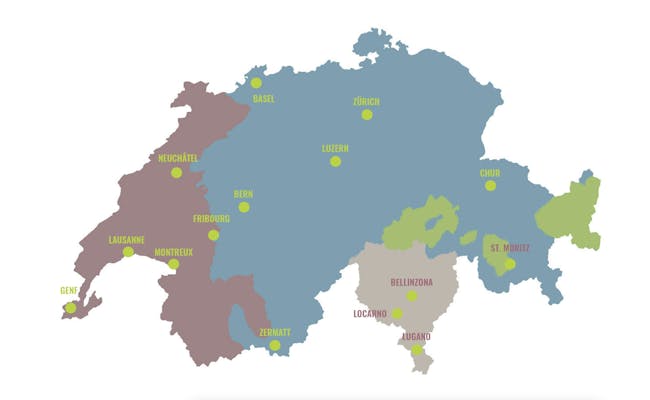
The distribution of languages in Switzerland (Map: Seraina Zellweger)
Where is German spoken in Switzerland?
German is the most widely spoken language in Switzerland, accounting for over 60%. The map shows the German-speaking part of Switzerland in blue.
German is the only official language in 17 of the 26 Swiss cantons. These are the cantons of Aargau, Appenzell Ausserrhoden, Appenzell Innerrhoden, Basel-Stadt, Basel-Landschaft, Glarus, Luzern, Nidwalden, Obwalden, Schaffhausen, Schwyz, Solothurn, St. Gallen, Thurgau, Uri, Zug and Zurich. In the cantons of Bern, Fribourg and Graubünden, both German and other languages are represented
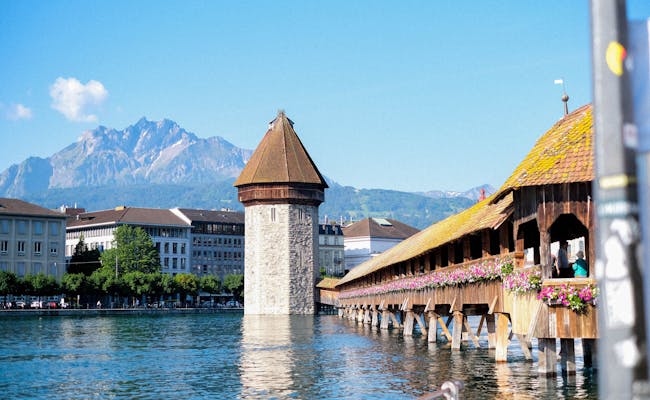
View of Lucerne (Photo: Unsplash Geertje Caliguire)
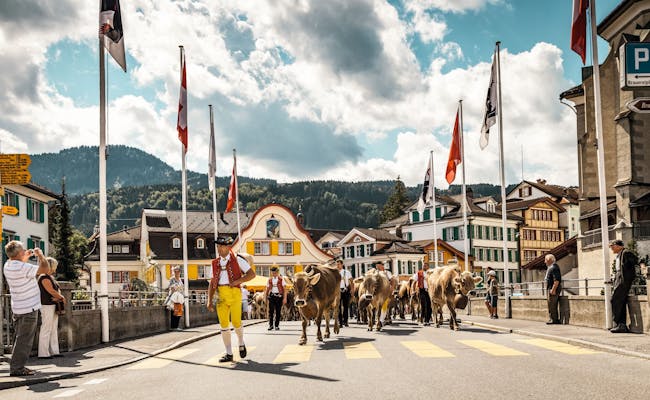
Alpine procession in Appenzell (Photo: Switzerland Tourism Jan Geerk)
Where is French spoken in Switzerland?
French is spoken by over 20% of the Swiss population. The map shows the French-speaking part of Switzerland in red.
In the cantons of Geneva, Jura, Neuchâtel and Vaud, French is the only official language. Together with German, French is the official language in the cantons of Bern (majority German), Valais (majority French) and Fribourg (majority French).
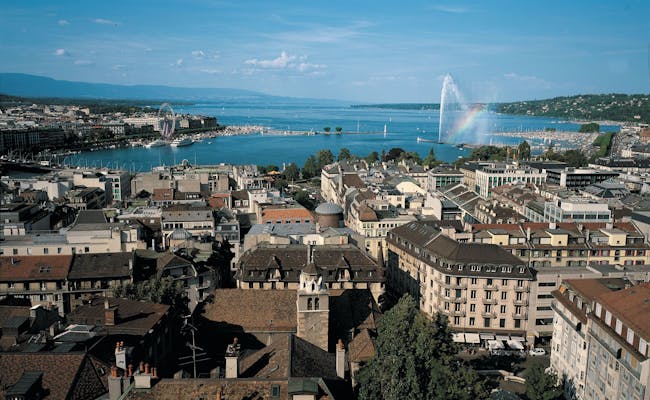
View over Geneva (Photo: Switzerland Tourism Stephan Engler)
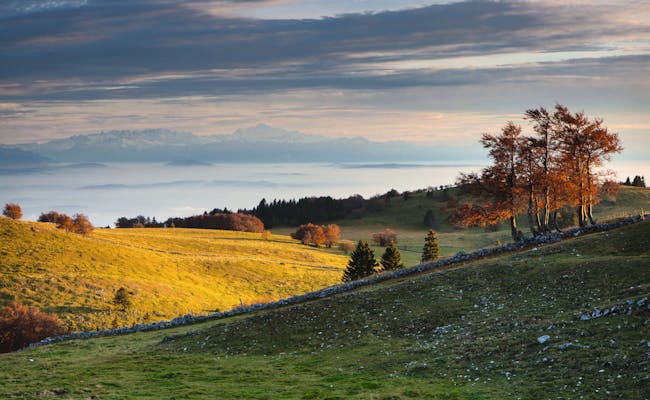
Green meadows in the Neuchâtel Jura (Photo: Switzerland Tourism Roland Gerth)
Where is Italian spoken in Switzerland?
At 8%, Italian is less widely spoken than German and French. Nevertheless, the language is an integral part of the Swiss linguistic landscape. You will find it partly in the southern regions of the Grisons and Valais. However, Italian is mainly spoken in the canton of Ticino. Here it is the only official language.
On the map you can see the Italian-speaking part of Switzerland in gray.
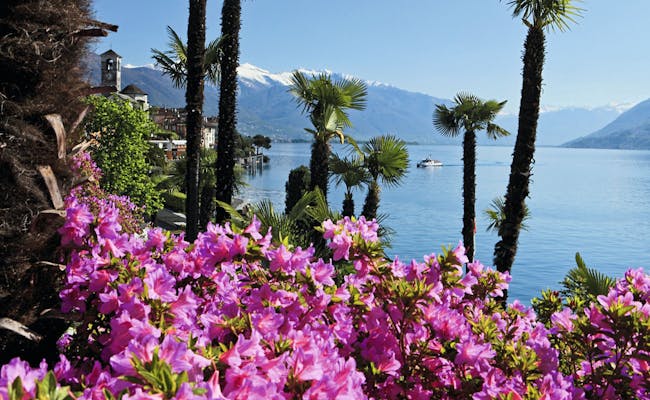
View of Lake Maggiore (Photo: Switzerland Tourism Christof Sonderegger)
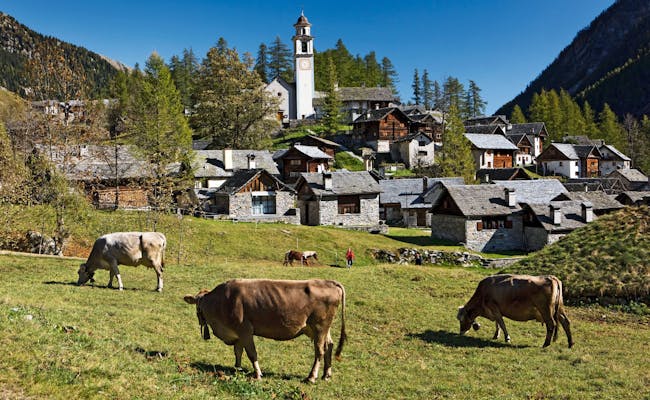
Small mountain village in Ticino (Photo: Switzerland Tourism Christof Sonderegger)
Where is Romansh spoken in Switzerland?
Rhaeto-Romanic is the language with the smallest linguistic share in Switzerland. Just 1% of the population speaks Romansh. If you want to hear this special language, which somewhat resembles a mixture of French and Italian, you have to go to the trilingual canton of Graubünden
Here, three official languages have equal status on official paper: German, Italian and Romansh. The time-honored language with Latin roots is very present in everyday speech.
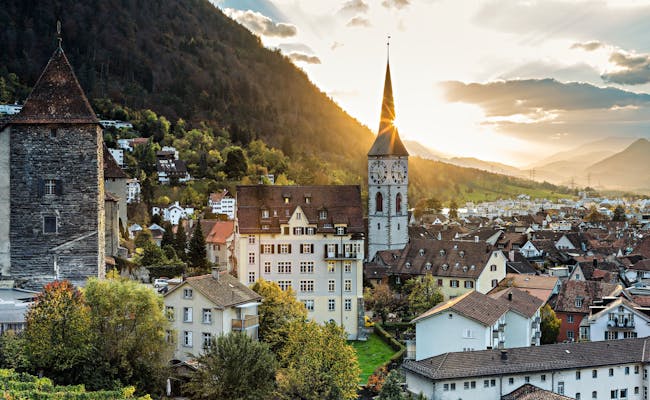
Chur at sunset (Photo: Switzerland Tourism Andreas Gerth)

Landscape in Graubünden (Photo: Switzerland Tourism Christian Meixner)
What is Swiss German?
Swiss German is a special construct. First, there is no such thing as the Swiss German par excellence. German-speaking Switzerland has a great variety of different dialects. An Appenzeller and a Berner use different words just as much as a Bündner and a Basler do. But basically we understand each other quite well. Except for a few typical words that each dialect uses differently again.
Some characteristics that Swiss German brings along are the following:
- There is no spelling. No rules. Swiss German is spoken as one’s beak grows. This often leads to heated discussions between members of different dialects about how to say something correctly. But since there is no spelling, there is no right and wrong
- Swiss German is only spoken and is therefore not a written language. Of course, informal messages between friends, families and acquaintances, especially among the younger generations, are often written in Swiss German. But officially, written German is the valid written language.
- Our German neighbors often have trouble understanding Swiss German. If they live in southern Germany, roughly up to and including Stuttgart, they often understand us quite well. But the further north they are at home, the more incomprehensible our dialects seem to them
To show you a few differences between German and Swiss German, we have put together a little table for you. As you can see, there are sometimes different words for the same term in Switzerland, depending on the dialect
| German | Swiss German |
|---|---|
| carrot | Rüebli |
| croissant | Gipfeli |
| breakfast | Zmorge |
| lunch | Zmittag |
| dinner | Znacht |
| potato | Härdöpfel / Äerdli |
| gossip | Schnädertante |
| to go shopping | go poschte / iichaufe |
| to cry | brüele / brööle / hüüle |
| swing | Gigampfi / Riitiseili / Riitiplampi |
| peas | Buärli / Erbsli |
| to ride an inflatable boat | böötle |
| bottle | Guttere |
| be that as it may | item (widespread in the canton of Bern) |
| runny nose | Schnuderi / Pfnüsel |
| larynx | Gurgeli |
| Guinea Pig | Meersäuli |
Other languages in Switzerland
An estimated 6% in Switzerland speak English as their main language. You can usually get around our country with English without any problems. It is now considered the secret fifth national language. When Swiss people from different language regions meet, they often prefer English to one of the official national languages.
Switzerland is popular as a country of immigration. With foreigners making up over 25% of its population, Switzerland ranks fourth in the world after Singapore, Australia and New Zealand. Portuguese, Albanian, Serbo-Croatian or Spanish are not rarely heard. With a share of over 1%, they lead the long list of Switzerland’s 40 other languages.
You think Latin is dead? Not in Switzerland. We like to use it for neutral communication, to deliberately favor none of the national languages. Especially when it comes to nationwide projects or initiatives: Pro Senectute, Pro Natura, Pro Patria, Confoederatio Helvetia (written on coins/stamps), just to name a few.
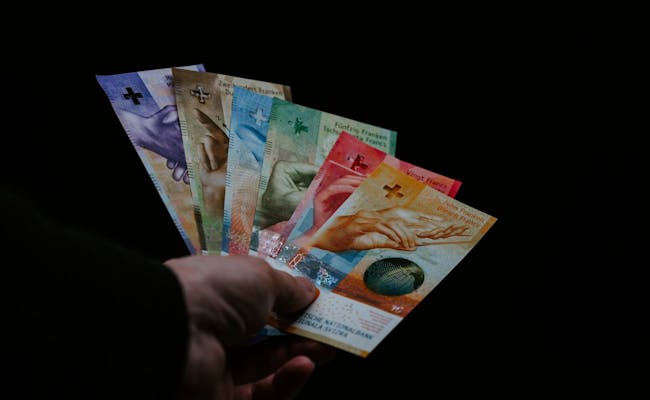
Swiss banknotes (Photo: Unsplash)
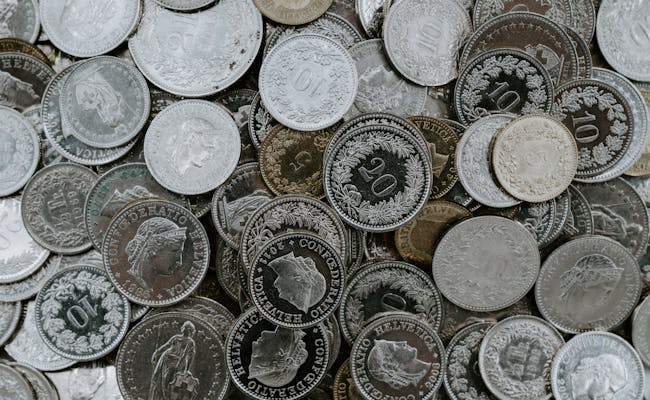
Swiss coins (Photo: Unsplash Claudio Schwarz)
Is English spoken in Switzerland?
Many Swiss people speak good English. Especially in the cities, you will be able to communicate effortlessly in most cases. English is taught at an early age in schools and is part of general education. Thanks to its linguistic diversity, Switzerland is a very travel-friendly country. You will meet multilingual people who will be happy to help you regardless of your language skills.
Of course, we can’t generalize here. There are also places in Switzerland where English is not widely spoken. Especially in rural areas, you may get an embarrassed shake of the head when you ask “Do you speak English?”
Naturally, in remote areas, multilingualism reaches its limits. That’s where a good translation app can come in handy. Instead, you’ll encounter a very authentic Switzerland with people who are strongly rooted in their local culture.
Do all Swiss speak multiple languages?
Every student must learn at least one other official language. Therefore, most Swiss know two national languages plus English. In addition, schoolchildren in German-speaking Switzerland learn High German as a written language from the first day of school. Thus, written German is considered their first foreign language. However, their Swiss German, as a dialect, always remains their mother tongue.
The Swiss therefore grow up multilingual, even if they do not speak all the national languages. All products show at least the three main national languages on their labels: German, French and Italian. Announcements at airports and train stations, on trains or in other public spaces are also made in the three national languages plus English. The same advertising is available in the local language in the various language regions. Each language region has its own radio and TV stations in its official language.
The high level of education and the multilingualism of its inhabitants make Switzerland an attractive location for international companies. As a visitor, you will rarely experience language barriers and will encounter linguistically savvy, helpful people.
What is the Röstigraben?
Rösti is a typical potato dish from Switzerland. The so-called “Röstigraben” stands for the language border between the German-speaking and French-speaking parts of our country. It is also the invisible dividing line between the cultures of Switzerland’s two largest language regions. Not infrequently, these cultural differences stand out in political voting results.
Along this line lies a series of bilingual cities:
- Sierre/ Sitten (almost 90% French)
- Fribourg/Freiburg (about 80% French)
- Bienne/Biel (over 40% French)
- Murten/Morat (15% French)
Biel/Bienne is the largest bilingual city and is regarded nationwide as a model student in this discipline. But the other cities are in no way inferior in this respect. The 125th anniversary of the Fribourg Gastro Association, for example, was celebrated together by both language groups as a matter of course.
Fribourg is divided linguistically by a natural border. If you cross the Saane from the German-speaking east, you will already be addressed in French on the other side of the river. Fribourg authorities work in both official languages and you will find a consistently bilingual education system. A vivid example of the linguistic and cultural coexistence of these cities on the Röstigraben.
Swiss Activities Tip:
If you cross the Röstigraben on the train, you will notice it immediately. If in Bern the announcements were first in German, the station in Fribourg is already announced in French. Pay attention to the language of the train attendants. After crossing the language barrier, they too automatically change the language in which they address their customers
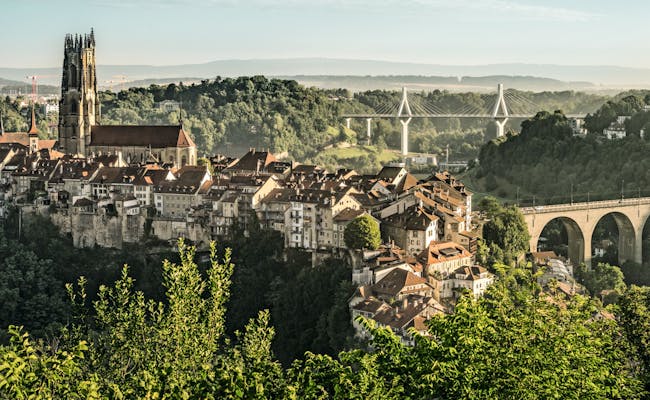
View of Fribourg (Photo: Switzerland Tourism Markus Muehler-Rasom)

Cityscape of Murten (Photo: Switzerland Tourism)
Swiss history shapes language diversity
The modern federal state of Switzerland came into being in stages. With the annexation of the sovereign cantons to the then Swiss Confederation, the present languages gradually came together. Willingness to compromise was the key word and still shapes the balanced handling of our linguistic diversity today.
Early on, various cantons, including the dual-language states of Bern and Fribourg, provided decisive impulses for the emergence of today’s Switzerland. German with its dialects and French soon gained in importance. The annexation of the French-speaking cantons in the 19th century strengthened our francophone vein.
With the annexation of Ticino to the Swiss Confederation, Italian officially became part of the Swiss linguistic landscape in 1803. The same applies to Graubünden with its fourth national language, Rhaeto-Romanic. Now globalization is advancing. English is therefore increasingly becoming a popular language in Switzerland.
Economic influences on the languages of Switzerland
Three quarters of Switzerland’s domestic product comes from exports. The lion’s share of exports goes to the USA and our neighbors. We cover these economic areas with our national languages. Conversely, our presence abroad enriches the Helvetic linguistic landscape.
In addition to other factors, Switzerland’s many languages attract numerous companies to our country. Our economic area is growing and with it the diversity in our culture and linguistic landscape. This diversity thrives with minimal government interference. A cultural richness that you can experience firsthand during your trip through Switzerland.
Our strong economy makes Switzerland attractive to immigrants. Language diversity is thus increasing. With it grows the willingness as well as the ability to communicate beyond language barriers. This Helvetic multilingualism proves to be a catalyst for successful coexistence.
Democracy in Switzerland and its linguistic diversity
Communication is the blood in the veins of a direct democracy. National concerns in a federal system like Switzerland must take linguistic diversity into account. Voting content only reaches the voter when you address him directly.
That is why the nationwide voting documents are always sent out in three languages. Balanced attention to the languages of Switzerland forms the basis of a fair political debate. It is the linguistic version of equality and equal opportunities.
It is not uncommon to encounter politicians in this country who are fluent in three national languages. On the TV and radio stations of the various language regions, they give interviews in the respective national language. Anyone who insists on speaking his or her own language hardly has a chance in Switzerland’s highly developed political system.

Fighter and hero monument in Bern (Photo: Unsplash Hansjörg Keller)

Federal Palace Bern (Photo: Switzerland Tourism Martin Maegli)
Despite linguistic and cultural diversity, a historically grown togetherness prevails in our nation of wills. The languages of Switzerland are our national pride and are as much a part of it as cheese and chocolate.
